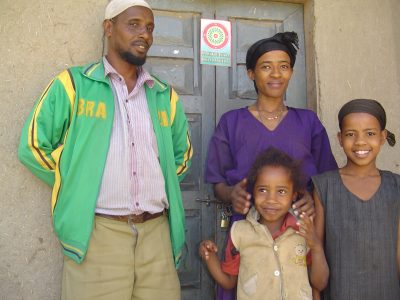Mr. Geleta, who lives with his wife, son, and daughter, was visited by a PMI-trained volunteer and received information on malaria prevention and control.

Mr. Geleta and his family stand in front of their home in Ethiopia, which is marked with a green sticker on the door, indicating that the family followed all four malaria actions. Source: Zelalem Mekuria, FHI 360
“The trouble usually started around October,” says Dejene Geleta, as he describes how his community in the Ameya District of the Oromia Region of Ethiopia used to cope with malaria. “In my area, many people got sick with malaria and were bedridden for days. Our children missed many school days, because the start of the school year always corresponded with malaria season. Some of us took the yellow pills that we got from the clinic and some of the people took traditional medicine.”
Malaria is highly preventable when the right precautions are taken and populations are well-informed of the risks. Many people suffer needlessly from the disease simply because they do not know why insecticide-treated mosquito nets are necessary and how to use them, or where to seek treatment when malaria symptoms arise. Behavior change communication is therefore a key intervention for the success of malaria control and prevention. Ethiopia’s Ministry of Health has focused its national malaria control strategy on mobilizing and empowering communities to bring about sustained change in their daily habits to protect them against malaria.
In support of the government’s goal, PMI has trained volunteers and health extension workers to provide information to community members on four malaria prevention actions through house-to-house visits. These actions are: (1) allowing one’s house to be sprayed with insecticide, (2) regularly using an insecticide-treated mosquito net, (3) visiting a health facility promptly when malaria symptoms develop, and (4) adhering to the treatment if malaria infection is detected.
Mr. Geleta, who lives with his wife, son, and daughter, was visited by a PMI-trained volunteer and received information on malaria prevention and control. He recounts how people living in his area reacted to the new malaria sensitization activities: “Last year, we noticed many volunteers and health extension workers going house to house and giving people a leaflet with information on malaria prevention. They told us that if we could follow the four prevention actions, we could easily protect our families from malaria. Now, many family members sleep under mosquito nets and, when anyone gets sick, we take them to the clinic immediately. We now know that we should take all pills and that pregnant women and children under five are especially vulnerable to the disease.”
Mr. Geleta credits his newfound knowledge and behavior change to the volunteer who visited his house and others in his community. He points to the colorful sticker on the front of his house which is given to champion households who have demonstrated all four malaria prevention and control actions. He smiles and shares, “I am proud to have earned this, which shows that I am protecting my family against malaria.” PMI’s support for social and behavior change communication is providing families in malaria-prone areas with the tools and knowledge to keep them healthy and productive.
